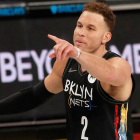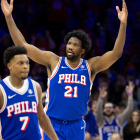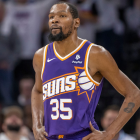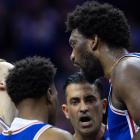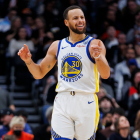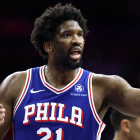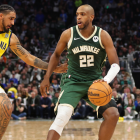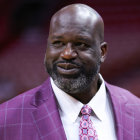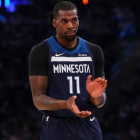
The antidote for buyout mania is a sense of history. Every year, veteran NBA players migrate from crummy teams to competitive ones, usually after the trade deadline, usually just a few months from hitting free agency. Most of the time, the buyout guys make headlines but don't make a difference.
When I dove into this subject four years ago, the Boston Celtics were a useful entry point. Team president Danny Ainge had just done a radio interview describing how midseason additions can do more harm than good: The vet might take minutes from a younger, better player; change players' roles and disrupt team chemistry. P.J. Brown is revered in Boston for helping the 2008 Celtics win a title, but Stephon Marbury, Michael Finley, Sasha Pavlovic, Troy Murphy, Carlos Arroyo, Ryan Hollins, Terrence Williams, Shavlik Randolph and D.J. White — all signed as free agents in-season from 2009 to 2013 — are not remembered so fondly.
Ainge's front office didn't sign a buyout guy for several years but in 2018 added center Greg Monroe, who put up perfectly fine counting stats in 26 regular-season games but had ugly on/off numbers and fell out of the rotation in the playoffs. A year later, after Monroe had been signed and salary-dumped by the Toronto Raptors, Boston brought him back on a 10-day contract. He logged just five minutes in two appearances, then signed with the Philadelphia 76ers in the final week of the regular season. Monroe memorably started one game in the first round of the playoffs, with Joel Embiid sidelined, and the Sixers had a net rating of minus-20.6 in his 90 minutes of postseason playing time. Monroe has not played in the NBA since.
If this season feels different, it's because some of the names are bigger than normal and not far removed from stardom. In 2019, Blake Griffin and LaMarcus Aldridge were All-Stars and Griffin made All-NBA. The previous season, Aldridge and Andre Drummond were All-Stars and Aldridge made All-NBA. Drummond will supplant Marc Gasol in the Los Angeles Lakers' starting lineup. Brooklyn Nets coach Steve Nash said Aldridge will have the chance to compete for the starting spot. The Nets have a 2019 All-Star at every position.
All of these players, however, are going to have smaller roles than they're used to. When a midseason acquisition works, be it a signing like these or a trade, it's because the player addresses a need, fits the style of play and complements the best players on the roster. Last season, Markieff Morris played a meaningful playoff role for the Lakers simply by hitting a good percentage of his open 3s and giving them another frontcourt option when they needed to downsize. Simultaneously Reggie Jackson got back on track with the Los Angeles Clippers, Trey Burke earned himself a three-year contract with the Dallas Mavericks and Jeff Green, now teammates with Aldridge and Griffin in Brooklyn, found new life as a stretch 5 with the Houston Rockets. On the buyout market, a home run looks like a solid single.
Here are five thoughts on how this year's buyout guys will fare:
1. Spread the floor the Brooklyn way
Aldridge gives the Nets yet another frontcourt option, and he has shown this season that he can be effective offensively as a stretch 5. Neither Griffin nor Green is the same kind of pick-and-pop threat, and neither has true center size. Like Griffin, he can punish switches in the post.
On the one hand, Brooklyn already had a logjam. On the other, the Nets are malleable as gold. If Nash wants to switch everything, he can go with second-year big Nicolas Claxton, the magnificently positionless Bruce Brown, Green or even Griffin, who has blended in about as well as the coaching staff could have hoped through four games. If Brooklyn needs to space the floor, it can call on Green, Aldridge or Griffin. Against a tough, physical 5, the Nets can use DeAndre Jordan or turn to Aldridge.
In a playoff series, it helps to have options. At the beginning of last season's playoffs, the Lakers started JaVale McGee at center and brought Dwight Howard off the bench. Both of them were removed from the rotation in the second round, in favor of more modern lineups with Anthony Davis or Morris at center. Howard's playing time fluctuated from then on, and while he played 35 minutes in Game 5 of the Western Conference finals, he got just a minute of garbage time in the championship clincher. McGee logged a DNP-CD in every Finals game.
As inevitable as the Lakers' title may seem in retrospect, they might not have even escaped the second round without Morris. And while the quality of a team's ninth man feels irrelevant when you're watching stars log 40-plus minutes and coaches deploy eight-man rotations, the truth is that, like insurance, depth only feels unimportant until it's absolutely critical. An injury can turn a series. A matchup problem can end a season.
The question is who will be the Nets' versions of Howard and McGee. Given the sheer number of players in the mix, how minutes are managed is anybody's guess. "The best part about that is it's not my job to worry about that," Griffin said Monday. He also said he is "thrilled to have LaMarcus on the team," isn't concerned about his own playing time declining and hadn't even thought about it until a reporter brought it up. "It's something that I can't predict," Nash said Sunday. "We'll see how it all fits together, and it'll present itself." Nash also said that they're excited about having lots of depth and lots of options.
"About minutes, I mean, if you do your job and you go out and you compete and you do everything you can, everything's going to be fine," Aldridge said Tuesday. "And we're all here to win, so it's not about that."
Aldridge said that anyone who is competitive wants to start and he hopes that he can earn the job. Jordan has been Brooklyn's almost-every-night starter, but Nash brought him off the bench against the Clippers and Mavericks to match up with their paint-bound backups. Claxton has been in the closing lineup recently, and with only 30 regular-season games on his résumé, he needs all the reps he can get. He has yet to even share the floor with Kevin Durant.
For about a year and a half, the Nets had a much simpler dilemma in the frontcourt: Jordan vs. Jarrett Allen. It was discussed to death because it represented the franchise's new era, headlined by superstars, in direct competition with the previous one, in which Sean Marks' front office and Kenny Atkinson's coaching staff had acquired and developed young talent. What felt like the central tension of the team now feels quaint. Allen came off the bench at the beginning of the season, clearly outplayed Jordan and took the starting spot two weeks in. When Brooklyn traded him in the James Harden deal, it looked extremely thin up front. Rookie big Reggie Perry got regular minutes for a while. Durant started at "center" next to Brown in his return to Oakland on Feb. 13, his most recent appearance. When Durant comes back from his hamstring injury, likely next week, I do not expect Nash to put him at shooting guard, like P.J. Carlesimo did 13 years ago in Seattle. But it would make things less complicated.
How you feel about Brooklyn's buyout bonanza likely hinges on how you think about cost. On minimum contracts, next to three of the most dangerous scorers in NBA history, nobody expects Aldridge or Griffin to put up huge numbers. ("I'm not here to be an All-Star," Aldridge said.) Anyone who is up in arms about the Nets getting these guys is either disingenuous or delusional, but there is a discussion to be had about the value of all this depth relative to the value of clear role definition. I'll be shocked if Aldridge's presence messes with Claxton's confidence the way Andrew Bynum's messed with Roy Hibbert's seven years ago, but I won't be surprised at all if Claxton's playing time takes a hit and every loss in the playoffs is followed by cranky columns second-guessing the minutes distribution. This is the non-financial cost of adding talent when you don't necessarily need it.
2. And now for something pretty similar
Drummond will be in the Lakers' starting lineup on Wednesday against the Milwaukee Bucks. If they're fully healthy in the playoffs, putting Davis at 5 will mean marginalizing one or two accomplished big men. Going from Howard and McGee to Gasol, Montrezl Harrell and now Drummond is a massive upgrade, but this could get weird.
When Drummond is on the court, the Lakers will have more of the oomph that they had last season, when their sheer size and physicality overwhelmed some opponents. Gasol is a superior defender, but Drummond at his most active can be disruptive on that end. Drummond is seventh in the league in deflections and no center averages more steals. Offensively, he's not going to fix Los Angeles' spacing problem, but he gives the team another roll man, another good high-post passer and a source of extra possessions. For the time being, with Davis and LeBron James sidelined, Los Angeles can use any boost it can get.
"We're going to need all three of our centers throughout this playoff push — this championship run, hopefully," Vogel said Wednesday.
Drummond hasn't played in more than six weeks, and he said Wednesday that his excitement level is at an all-time high. Los Angeles has to hope that the opportunity to compete for a title -- something entirely new to Drummond, who has played in eight total playoff games and lost all of them -- brings out the best in him. In theory, he should look like a better finisher next to LeBron, and he should bring energy every night when every game is consequential. He surely understands that his usage rate, which surged to a career-high 30.3 percent this year with the Cleveland Cavaliers, will plummet. Ideally his 50 percent true shooting percentage will go in the other direction.
Like the Nets' recent signings, this is impossible to criticize in terms of value. If Drummond turns out to be a horrible fit, the Lakers could conceivably bench him or even waive him. A more realistic and more worrying scenario, though, is one in which he kinda, sorta fits, but gets in the way of them being their best selves when they need to be. They needed to play Davis at 5 in big moments in the bubble, and they signed Gasol to improve their spacing and passing in the halfcourt. Their big-picture priorities should not shift.
3. A surprising but sensible Spurs signing
I didn't expect Gorgui Dieng to choose the Spurs, but it's a natural fit. San Antonio's roster is full of slashing guards, and Dieng's job will be to knock down the drive-and-kick 3s they create. In 22 games for the Memphis Grizzlies this season, Dieng shot 23-for-48 (47.9 percent) from 3-point range.
Dieng could have gone to a team that gave him a better chance of winning a championship. The Clippers, Sixers, Suns, Nets, Heat, Knicks and Raptors pursued him, according to The New York Times' Marc Stein. On Monday, Dieng said it felt like college recruiting all over again, and he felt most comfortable with what he heard from the Spurs. "That's why I'm here," he said, adding that he likes the Spurs' ball movement and is excited about playing for a Hall of Fame coach.
"I think I will fit good," Dieng said. "I'm defensive-minded, I can shoot 3s. I feel good, I don't have any issues. I'm a role player and, like I always say, I'm here to serve the team."
He sounds like a Spur already, and he should thrive in San Antonio as a pick-and-pop guy and floor spacer, a.k.a. the role Aldridge played in the first half of the season. If he keeps shooting like he did in Memphis, the second unit will be stronger than it's been with Drew Eubanks backing up Jakob Poeltl. And while he doesn't have the same All-Star pedigree, Dieng could be better than this iteration of Aldridge was for this iteration of the Spurs. At this point in their respective careers, Dieng is the better defender. In the minutes that Aldridge played for San Antonio this season, the team surrendered 115.5 points per 100 possessions, per Cleaning The Glass, which filters out garbage time and heaves. That is about the same as the Timberwolves' 27th-ranked defense this season, and it is seven points per 100 possessions worse than the Spurs' defense has fared with Aldridge on the bench.
Dieng isn't a dominant rim protector or a hyper-mobile, switch-everything big. But he doesn't have to be. As a help defender, he will block some shots and change more of them, and the coaching staff can trust him to execute the scheme the way he is supposed to. San Antonio will likely spend most of its time in drop coverage when he's on the court, just like it did with Aldridge, but it will now have a fighting chance when asking its floor-spacing big to defend ball screens at the level.
4. Reading the Teague leaves
Jeff Teague is reuniting with Mike Budenholzer in Milwaukee, and he'll give them the backup point guard they lost when they traded D.J. Augustin in the P.J. Tucker deal. While Teague will benefit from all the spacing his teammates provide, it's hard to imagine him reinforcing that spacing the way Augustin did.
This is a bit of a weird thing to say because Teague made 46.4 percent of his 3s in 34 games for the Celtics this season and Augustin made 38 percent of his in 37 games for the Bucks. In this case, though, it's about volume: Teague only averaged 3.3 3-point attempts per 36 minutes in Boston, which means he shoots 3s at virtually the same frequency as Embiid and Daniel Theis. Augustin, meanwhile, attempted 6.5 3s per 36 minutes, which means he shoots them about as often as Bradley Beal and Tyler Herro. Low-volume shooters don't have much gravity.
Teague has averaged 3.2 3-point attempts per 36 minutes for his career. He averaged a career-high 4.4 per 36 in 2015-16, his last year with Budenholzer's Hawks, and made 40 percent of them, easily his best shooting season until this one. In Milwaukee's system, he'll either have to get up more 3s or be more of a threat as a driver. This season a career-low 25 percent of his shots have been at the rim, per CTG, compared to 43 percent in 2016 and 37 percent in the 34 games he played for Minnesota last year. Teague turns 33 in June, and he shouldn't be expected to zip past defenders the way he used to, but this situation is pretty simple: Catch-and-shoot or drive-and-kick.
It remains unclear whether or not this is the last move the Bucks will make. When Austin Rivers hit the buyout market on Sunday, Milwaukee was in the lead to sign him, according to The Athletic's Shams Charania. This was before Teague had joined the party, but adding Rivers still makes sense. At 6-foot-4, with experience playing with Tucker in Houston, he is infinitely better suited for switching than Teague and Bryn Forbes are. He would also bring some extra ballhandling, which previous Bucks teams have needed in the playoffs, and the ability to change a game when he heats up.
Rivers cleared waivers at 5 p.m. ET on Tuesday. Milwaukee can sign him without going into the luxury tax. If he is still interested in going there, the Bucks should make it happen. Everything they've done is about the second round of the playoffs and beyond, at which point Rivers' skill set would be particularly helpful.
5. What's left?
As far as former All-Stars go, we've reached the end of the road. DeMarcus Cousins will join the Clippers on a 10-day contract, per ESPN's Adrian Wojnarowski, but his stint with the Rockets suggests he's unlikely to earn a rotation spot on a team that employs Serge Ibaka and Ivica Zubac. Cousins made just 33 percent of his catch-and-shoot 3s in Houston, and he took a ton of them. More concerning is that he shot just 43 percent at the rim, per CTG. Maybe the Clippers can use him as a facilitator and post him up against switches, but he'll need to finish better and draw fouls the way he used to. They'll need to cover for him defensively, too.
Other bigs available include Norvel Pelle, Noah Vonleh, Jordan Bell, John Henson and Dewayne Dedmon. Jabari Parker is without a team, as is Rondae Hollis-Jefferson. Jeremy Lin played well in the G League, Isaiah Thomas wants another shot, Kyle Korver hasn't officially retired and Jamal Crawford is probably playing pickup right now. There was speculation that Otto Porter, Mike Muscala, Kelly Olynyk, Cory Joseph and Hassan Whiteside might get buyouts, but a few of those guys are playing real minutes and it's possible that none of them end up on the market.
To be eligible to play in the playoffs, a player must be waived before April 9. In other words, if you're sick of everybody making such a big deal out of buyout season, it'll be over relatively soon.













